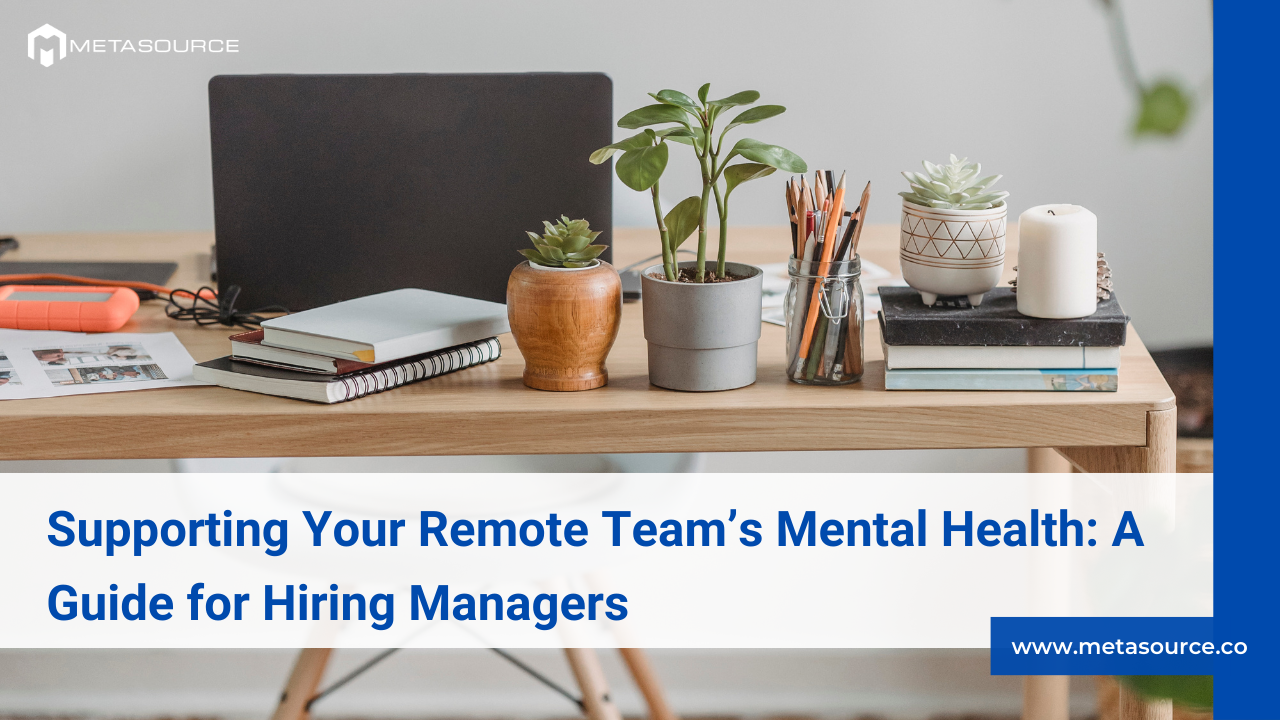Remote work has become a standard in many industries, providing flexibility and autonomy that employees value. However, the shift away from in-person offices has introduced unique mental health challenges that managers should not overlook. Studies show that remote employees are more prone to feelings of isolation, struggle with maintaining work-life boundaries, and may experience burnout at higher rates than their office-based counterparts.
As a hiring manager, it’s essential to recognize these challenges and take proactive steps to support your remote team’s mental well-being. Not only does this foster a more positive work culture, but it also enhances employee productivity, engagement, and retention. In this article, we’ll explore effective strategies to help you create a mentally healthy remote environment. By implementing these tips, you can build a connected, balanced, and supportive virtual workspace that empowers your team to thrive.
I. Recognize the Mental Health Challenges of Remote Work
Isolation and Disconnection
Remote work often leads to isolation, with 24% of remote employees listing loneliness as a major challenge in Buffer’s 2022 report. The lack of in-person interaction can lead to feelings of disconnection, affecting motivation and job satisfaction. Recognizing these feelings helps you understand the importance of creating a connected, inclusive remote environment.
Work-Life Boundaries and Burnout
Remote employees tend to blur work and personal life, leading to longer work hours. According to the WHO, remote workers often put in more hours than their office-based counterparts, increasing the risk of burnout. By setting clear expectations around work hours, you can help your team maintain a better work-life balance.
II. Establish Open, Supportive Communication Channels
Frequent Check-Ins and Transparent Dialogue
Regular check-ins and team meetings are essential for building trust and openness. Gallup reports that employees who frequently communicate with their managers are three times more engaged. Make mental health an open topic in these conversations, showing your team that their well-being is a priority.
Anonymous Feedback Channels
Allowing employees to provide anonymous feedback can be a game-changer. Tools like pulse surveys give insight into your team’s morale and concerns, empowering you to make adjustments as needed. Anonymous feedback encourages honesty, helping you adapt your approach to better support mental health.
III. Encourage Work-Life Balance
Set and Respect Work Hours
Encourage employees to define clear work hours. A study by Owl Labs found that remote employees work 26 hours more per month than those in offices. Support their need to unplug after work, demonstrating a respect for balance that can reduce burnout and improve mental health.
Model Healthy Boundaries
Show your team the importance of breaks by modeling them yourself. Simple methods like the Pomodoro Technique, where employees work in focused intervals with regular breaks, can increase productivity while preventing fatigue. As a leader, your actions set the standard for healthy work habits.
IV. Provide Mental Health Resources and Tools
Access to Counseling Services
Offering counseling or mental health resources through an employee assistance program (EAP) can significantly impact your team’s well-being. The American Psychological Association found that 75% of employees who use mental health resources report improvements in their mental health. Making these services available sends a clear message: mental health matters.
Host Mental Health Webinars
Organize monthly webinars or workshops on topics like stress management, mindfulness, and resilience. These sessions provide employees with practical tools to manage remote work challenges and show that your organization prioritizes mental health.
V. Facilitate Social Interaction and Team Connection
Organize Virtual Social Activities
Weekly or bi-weekly social events, like virtual coffee chats or team lunches, help remote employees feel connected. Deloitte’s research shows that 70% of employees believe strong personal connections at work enhance their well-being. These gatherings are simple but effective ways to strengthen team bonds.
Encourage Peer Support Networks
Creating peer support groups allows employees to share tips and discuss challenges. A “buddy system” can offer employees a sense of community and make them feel less isolated. When employees have peers to connect with, they are more likely to feel supported and engaged.
VI. Support Ergonomic Workspaces
Provide a Home Office Stipend
Supporting employees with a home office budget for essentials, like ergonomic chairs or desks, shows that you care about their physical well-being. According to Staples, 86% of employees believe ergonomic workspaces improve their productivity. This investment contributes to both physical and mental health.
Encourage Movement Breaks
Physical wellness directly impacts mental health. Encourage employees to take short movement breaks, which reduce strain and refresh focus. Share resources on ergonomics and simple stretches to help employees set up a healthy workspace.
VII. Continuously Gather Feedback and Adapt
Conduct Well-Being Surveys Regularly
Gathering ongoing feedback through surveys can help you assess the effectiveness of your mental health initiatives. Workhuman reports that 64% of employees feel that feedback improves their mental health. This data can guide adjustments in your support strategies, ensuring they remain relevant.
Implement Changes Based on Feedback
Show your team that their voices matter by implementing improvements based on their feedback. Hosting open feedback sessions and making real-time adjustments to your mental health support initiatives demonstrates your commitment to their well-being.
Conclusion
As a hiring manager, your proactive support can make a substantial difference in the mental health of your remote team. By fostering open communication, encouraging work-life balance, and offering mental health resources, you can create a healthy, connected, and productive remote work environment. Taking these steps isn’t just beneficial for employees—it’s an essential part of building a resilient, motivated team in the long term.
Metasource: Your Trusted Partner
Metasource is your trusted partner for consulting and supporting effective staff management across global teams, especially in culturally diverse environments like Vietnam.
Read more: Navigating the Complexities of Obtaining a Working Permit in Vietnam
Read more: How To Register A Limited Liability Company In Vietnam A Quick Guide
Discover more tips to help boost your business further in Vietnam by following us on our website and Linkedln page


